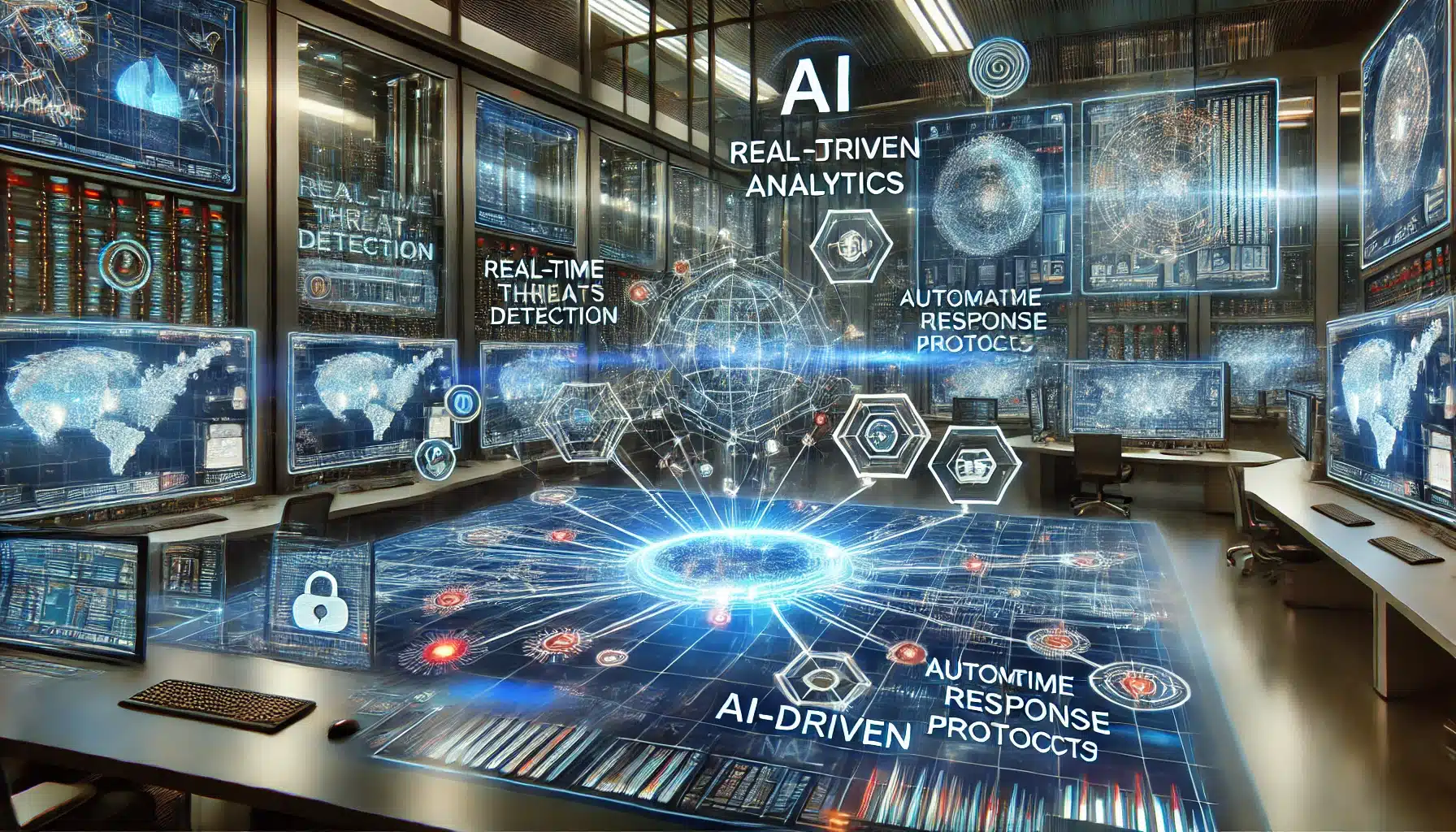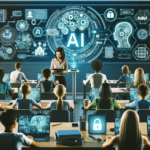Introduction: The Evolving Landscape of Cybersecurity
In an increasingly digital world, the importance of robust cybersecurity measures cannot be overstated. As cyber threats become more sophisticated and frequent, traditional security methods are struggling to keep pace. Enter artificial intelligence (AI) – a game-changing technology that’s revolutionizing the way we detect and prevent cyberattacks. This blog post will explore the cutting-edge applications of AI in cybersecurity, its benefits, challenges, and the future it promises for safeguarding our digital assets.
Understanding AI in Cybersecurity: The Basics
Defining AI-Powered Cybersecurity
AI-powered cybersecurity refers to the use of artificial intelligence and machine learning algorithms to enhance the detection, prevention, and response to cyber threats. This technology enables systems to learn from past incidents, identify patterns, and make real-time decisions to protect against evolving threats.
Key Components of AI in Cybersecurity
- Machine Learning (ML) algorithms
- Natural Language Processing (NLP)
- Deep Learning neural networks
- Behavioral analytics
- Automated threat intelligence
The Evolution of Cybersecurity: From Rule-Based to AI-Driven
Traditional Cybersecurity Approaches
Historically, cybersecurity relied heavily on rule-based systems and signature-based detection methods. While effective against known threats, these approaches often fell short when faced with novel or rapidly evolving attacks.
The AI Revolution in Cybersecurity
The integration of AI has transformed cybersecurity from a reactive discipline to a proactive one. AI systems can analyze vast amounts of data, identify anomalies, and predict potential threats before they materialize.
Comparison Table: Traditional vs. AI-Driven Cybersecurity

How AI Enhances Cybersecurity Capabilities
Real-Time Threat Detection
AI algorithms can analyze network traffic, user behavior, and system logs in real-time, identifying potential threats as they emerge. This rapid detection capability is crucial in minimizing the impact of cyberattacks.
Predictive Analysis
By leveraging historical data and current trends, AI can predict future attack vectors and vulnerabilities. This foresight allows organizations to proactively strengthen their defenses against emerging threats.
Automated Incident Response
AI-powered systems can automatically initiate response protocols when a threat is detected, containing the breach and mitigating damage before human intervention is required.
Enhanced Vulnerability Management
AI can continuously scan systems for vulnerabilities, prioritize them based on risk, and even suggest or implement patches automatically.
Improved Phishing Detection
Advanced NLP algorithms can analyze email content, sender behavior, and contextual information to identify sophisticated phishing attempts that might slip past traditional filters.
AI Technologies Driving Cybersecurity Innovation
Machine Learning in Threat Detection
Machine learning algorithms excel at pattern recognition, making them invaluable in identifying both known and unknown threats. Supervised, unsupervised, and reinforcement learning techniques are all employed in modern cybersecurity solutions.
Deep Learning for Complex Analysis
Deep learning neural networks can process and analyze unstructured data from multiple sources, enabling more comprehensive threat intelligence and anomaly detection.
Natural Language Processing for Threat Intelligence
NLP allows AI systems to parse through vast amounts of text data, including security reports, forums, and dark web chatter, to gather and analyze threat intelligence.
Behavioral Analytics for User and Entity Behavior
AI-driven behavioral analytics establish baselines for normal user and system behavior, flagging deviations that could indicate a security breach or insider threat.
Industries Benefiting from AI-Powered Cybersecurity
Financial Services: Protecting Sensitive Data
The financial sector, with its vast stores of sensitive customer data and financial information, has been quick to adopt AI-powered cybersecurity. These systems help detect fraudulent transactions, protect against identity theft, and secure online banking platforms.
Healthcare: Safeguarding Patient Information
In healthcare, AI cybersecurity solutions are crucial for protecting patient data, securing medical devices, and ensuring compliance with regulations like HIPAA.
Government and Defense: National Security Implications
Government agencies and defense organizations leverage AI to protect critical infrastructure, secure classified information, and defend against state-sponsored cyberattacks.
E-commerce and Retail: Securing Online Transactions
AI helps e-commerce platforms protect customer data, prevent fraud, and secure payment gateways, fostering trust in online shopping experiences.
Manufacturing: Protecting Industrial Control Systems
In the manufacturing sector, AI cybersecurity solutions safeguard industrial control systems and IoT devices from attacks that could disrupt production or compromise product quality.
The Benefits of Implementing AI in Cybersecurity
Faster Threat Detection and Response
AI systems can identify and respond to threats in milliseconds, dramatically reducing the time between detection and mitigation.
Improved Accuracy in Threat Identification
By analyzing complex patterns and contextual information, AI reduces false positives and improves the accuracy of threat detection.
Enhanced Scalability
AI-powered solutions can easily scale to handle the enormous volume of data and potential threats in modern IT environments.
Continuous Learning and Adaptation
Unlike static rule-based systems, AI cybersecurity solutions continuously learn and adapt to new threats, staying ahead of evolving attack techniques.
Cost-Effective Security Management
By automating many aspects of cybersecurity, AI can reduce the workload on human security teams and lower overall security management costs.
Challenges and Considerations in AI Cybersecurity Adoption
Data Privacy Concerns
The use of AI in cybersecurity often requires access to vast amounts of data, raising concerns about privacy and data protection.
The AI Skills Gap
There’s a significant shortage of professionals with the necessary skills to develop, implement, and manage AI-powered cybersecurity systems.
Ethical Considerations
The use of AI in cybersecurity raises ethical questions about autonomy, decision-making, and potential biases in AI algorithms.
The Arms Race with Cybercriminals
As cybersecurity defenses improve with AI, attackers are also leveraging AI to create more sophisticated threats, leading to an ongoing technological arms race.
Integration with Existing Systems
Implementing AI-powered cybersecurity solutions often requires significant changes to existing IT infrastructure, which can be challenging and costly.
The Future of AI in Cybersecurity
Quantum Computing and AI
The advent of quantum computing promises to revolutionize AI capabilities in cybersecurity, enabling even more complex analysis and stronger encryption methods.
AI-Driven Cyber Deception
Future AI systems may create sophisticated honeypots and deception techniques to lure and study attackers, providing valuable threat intelligence.
Autonomous Security Systems
As AI continues to advance, we may see the development of fully autonomous cybersecurity systems capable of making high-level decisions without human intervention.
Cross-Platform AI Integration
Future AI cybersecurity solutions will likely offer seamless integration across various platforms and devices, providing comprehensive protection in increasingly complex IT environments.
Case Studies: AI Cybersecurity Success Stories
Global Bank Thwarts Advanced Persistent Threat
A major international bank implemented an AI-powered security information and event management (SIEM) system, which detected and prevented a sophisticated APT attack, saving millions in potential losses.
Healthcare Provider Enhances Data Protection
A large healthcare organization deployed an AI-driven network monitoring solution that identified and contained a ransomware attack within minutes, protecting sensitive patient data.
E-commerce Giant Reduces Fraud
A leading e-commerce platform integrated AI-powered fraud detection, resulting in a 60% reduction in fraudulent transactions and improved customer trust.
Common Questions About AI in Cybersecurity
Can AI completely replace human cybersecurity professionals?
While AI significantly enhances cybersecurity capabilities, human expertise remains crucial for strategic decision-making, ethical considerations, and managing AI systems.
How does AI handle previously unseen cyber threats?
AI systems can identify anomalies and patterns that deviate from normal behavior, enabling them to detect novel threats even without prior exposure.
What are the potential risks of relying too heavily on AI for cybersecurity?
Over-reliance on AI could lead to complacency, and there’s always the risk of AI systems being compromised or manipulated by sophisticated attackers.
How does AI improve incident response in cybersecurity?
AI can automate many aspects of incident response, from initial detection to containment and remediation, significantly reducing response times.
What industries are leading the adoption of AI in cybersecurity?
Financial services, healthcare, government, and technology sectors are at the forefront of AI cybersecurity adoption due to their high-value data and complex security needs.
Conclusion: Embracing AI for a Secure Digital Future
As cyber threats continue to evolve in complexity and scale, the integration of AI in cybersecurity has become not just an advantage, but a necessity. By leveraging the power of machine learning, behavioral analytics, and automated response systems, organizations can stay one step ahead of cybercriminals and protect their digital assets more effectively than ever before.
The journey towards AI-powered cybersecurity is not without its challenges, from ethical considerations to the ongoing skills gap. However, the benefits far outweigh the obstacles. As we look to the future, it’s clear that AI will play an increasingly central role in safeguarding our digital world. Are you ready to harness the power of AI to bolster your cybersecurity defenses? The time to act is now – the next generation of cyber threats is already at our doorstep, and AI may be our best line of defense.


